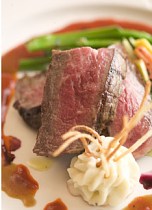| ●首页 ● 加入收藏 ● 网站地图 ● 热点专题 ● 网站搜索 [RSS订阅] [WAP访问] |
语言选择:
|
|
|
背景:
阅读内容 







VOA常速英语: FDA declares food from cloned animals safe
Download Audio A final report from the U.S. Food and Drug Administration concludes that meat and milk from cloned cows, pigs, goats and their offspring are safe for American consumers to eat and drink. Opponents, including a number of consumer and animal rights groups, say the FDA was heavily influenced by the biotechnology industry, and failed to consider possible side effects of cloning. VOA 's Cindy Saine reports from Washington.
Top Food and Drug Administration (FDA) officials were joined at a news conference in Washington Tuesday by U.S. Agriculture Department Undersecretary Bruce Knight, who said his department aGREes that foods from healthy cloned animals are just as safe as foods from ordinary animals. "USDA fully supports and aGREes with the FDA final assessment that meat and milk from cattle, swine and goat clones pose no safety concern, and these products are no different than food from traditionally-bred animals," he said. The FDA says, however, that it does not have enough information to make the same assertion about meat or milk from cloned sheep. The FDA's "final risk assessment," more than 900 pages long, comes after a seven-year review. The agency is not recommending special labeling for cloned animal products, saying labeling is only required for products that pose a safety threat. The report has drawn more than 30,000 comments from the public, about half of them expressing concerns about whether the cloned animal products would be labeled so that consumers would know what they are buying. Reaction from consumer and animal welfare groups has been largely negative. The West Coast Director of the Center for Food Safety , Rebecca Spector, raised strong objections. "The Center for Food Safety feels that the FDA's announcement was very irresponsible," she said. "For starters, the FDA's risk assessment was based on incomplete and flawed research, and it relies on studies that are supplied by cloning companies. So we really do not feel that the FDA did an adequate job reviewing the safety of milk and meat from cloned products before making this announcement today." The FDA points out that regulators in New Zealand and the European Union have come to the same conclusion about the safety of food products from cloned animals. The European Food Safety Authority is still taking comments on its proposal to allow meat and milk from cloned animals. Surveys show that many American consumers are reluctant to eat cloned animals or their offspring. The nation's largest milk company, Dean Foods and the world's biggest pork processor, Smithfield Foods, have said they have no immediate plans to start selling the products. The FDA says it will be years before food from clones makes it way to grocery story shelves, because the clones are much too valuable to slaughter or milk. They will mainly be used for breeding purposes, to improve the quality of the herd. Cloning has been a matter of fascination, but also of bitter controversy worldwide ever since Scottish scientists announced in 1997 that they had produced a cloned sheep, Dolly. 相关新闻
本文评论
全部评论
发表评论
|
内容查询
热门专题
本周热门内容
|


